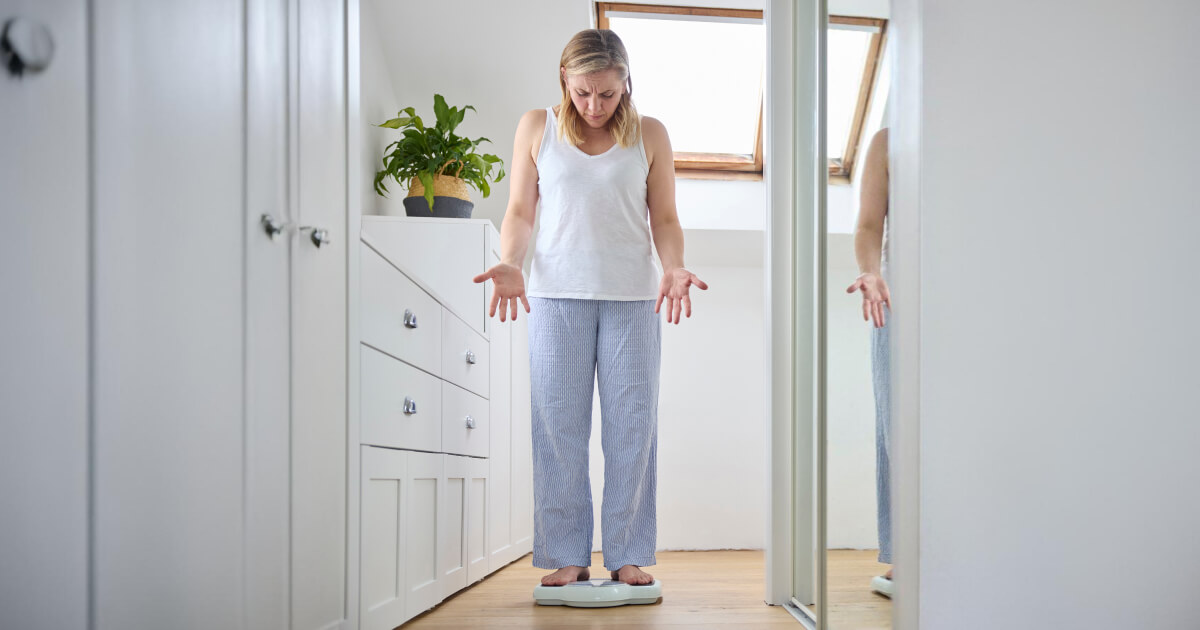Login to your account
- Prescription included
- Genuine medication
- All-inclusive service - No hidden fees
- Free next-day delivery
HRT patches and their side effects
Discover the side effects of HRT patches and how to manage them
Hormonal replacement therapy (HRT) patches are transdermal patches that deliver hormones slowly into your body through the skin. They are used to address symptoms of menopause, such as hot flashes, night sweats and vaginal dryness.

If you are planning to start continuous combined HRT, it’s best to be aware of both common and uncommon side effects. This article will provide information on what they are, how to recognise them, and how to manage them.
What are the most common side effects of hormone replacement therapy patches?
The most common side effect of HRT patches is that can affect the skin where they are applied. Patches may cause skin irritation, redness or itchiness. This is reported to affect more than 1 in 10 people.
Other common side effects are listed below:
|
|
Breast pain
Sometimes, you may experience breast pain or tenderness with HRT. However, this usually settles within a few months.
Evidence shows that taking HRT slightly increases the risk of breast cancer. The extra risk depends on how long you use HRT. After stopping HRT, the extra risk will decrease with time.
It’s important to recognise the symptoms of breast cancer and report them to your doctor. These include:
- a breast lump or swelling in the breast, often without pain
- change in size, shape or appearance of the breast
- dimpling, redness, pitting or other changes in the skin
- change in nipple appearance or the skin surrounding the nipple
- nipple discharge including bleeding from the nipple
- breast pain that does not go away
Feeling depressed
Some research shows that there is a link between some forms of HRT and depression. However, even though there is a link, this does not necessarily mean that HRT causes depression.
In these studies, there is a possibility that some women might have had undiagnosed depression before they began HRT.

If you experience low moods or distressing thoughts including thoughts of self-harm, please speak to your doctor immediately.
Vaginal bleeding or spotting
It's common to have irregular vaginal bleeding or spotting in the first few months after you start taking HRT. This is nothing to be worried about and it usually settles down within a few months.
However, if this does not go away or bothers you, tell your doctor. They might suggest changing your dose or treatment.
Weight gain
There's little evidence that most types of HRT make you put on weight. In fact, research shows that women often gain some weight during menopause and as they get older, regardless of taking HRT.
During menopause, the decrease in oestrogen and progesterone, along with ageing triggers metabolic changes in the body.

It’s common for women entering menopause to gain weight and belly fat. However, HRT may contribute to some bloating in the midsection which could give the appearance of weight gain.
What are the less common side effects of HRT patches?
Although these side effects occur less frequently, it's still important to be aware of them.
|
|
Vaginal thrush
Studies show that postmenopausal women taking HRT have an increased risk of developing vaginal thrush (a yeast infection) compared to those who are not on HRT. This is because oestrogen causes cells to produce glycogen (a stored sugar), which can cause candida to overgrow.
Symptoms of thrush include white vaginal discharge, itching and irritation around the vagina, soreness and stinging during sex or when you pee. Report these to your doctor, they may recommend using a treatment, such as Canesten.
Water retention
You may have water retention when taking HRT. This is when too much water builds up in your body. This can feel similar to weight gain and may cause bloating, swollen hands or ankles, and leg discomfort.
If this happens, tell your doctor as they may need to change the dose or type of HRT you are taking.
Allergic reactions
In rare cases, it's possible to have a serious allergic reaction to HRT. The symptoms of an allergic reaction include:
- swelling of the lips, mouth, throat or tongue
- fast breathing or struggling to breathe (e.g. wheezing or gasping for air)
- difficulty swallowing
- becoming very confused, drowsy or dizzy suddenly
- fainting without waking up
If you experience any signs of an allergic reaction, seek immediate medical attention.
Very rarely, this medicine can make you feel bloated or develop gallstones. However, this affects less than 1 in 1,000 people.
For a full list of side effects, refer to the patient information leaflet.
How long do side effects last?
Generally, side effects are worse when you first start treatment and usually settle on their own within 6 to 8 weeks as your body gets used to the medication.
Some people find that these side effects don't majorly impact their daily activities, while others may find them troublesome. If you're having difficulty coping with the side effects of HRT, we advise you to consult your doctor.
How can I manage the side effects of HRT patches?
Finding the right HRT for you may require some trial and error. You'll have to decide if the benefits of HRT patches are worth the potential side effects you may experience. Some people may choose to endure menopausal symptoms, while others might prefer HRT even if it means dealing with some unpleasant side effects.
Outlined below are some techniques to deal with common HRT side effects.
| Side effect | Management strategy |
|---|---|
| Irritated skin where the patch is applied | Talk to your doctor as you may need a different treatment. |
| Weight gain | Try exercising regularly and eating a balanced diet to manage your weight. |
| Headaches | This usually only lasts for a few days after you start treatment as your body gets used to the medicine. Try taking a painkiller such as paracetamol. If headaches last longer than a week or are severe, speak to your doctor. You may need to change your dose or switch to a different type of HRT. |
| Breast tenderness or pain | This usually improves after 4 to 6 weeks as your body gets used to the medicine. If it lasts for longer than this or becomes too painful, speak to your doctor. Your doctor may suggest trying a different dose or changing to a different type of HRT. |
| Nausea | This mainly occurs with HRT tablets or capsules. However, if you experience this with patches, try to eat simple foods until your body gets used to the medicine. The nausea should wear off after a few days, if it lasts for more than a week, speak to your doctor. |
| Diarrhoea | This is more likely to happen with HRT tablets or capsules, not patches. If this occurs, drink plenty of fluids to avoid dehydration. If the diarrhoea lasts more than a week, speak to your doctor about changing your dose or looking at other treatment options. |
What other HRT options are there?
HRT is not a "one size fits all" solution. The type and dosage depend on your individual needs. Other options of HRT include oral tablets, gels, or sprays.
Tablets
These are one of the most common forms of HRT. You usually take them once a day. Both oestrogen-only and combined HRT are available as tablets. At euroClinix we currently offer options such as Kliovance, Elleste and Premarin.
Vaginal oestrogen
Vaginal oestrogen comes as a tablet, pessary, cream, gel or ring that you insert into your vagina. This is a local form of HRT which may help with menopausal symptoms such as vaginal dryness or irritation.
Oestrogen gel or spray
These are topical forms of HRT. The gel is applied to the skin and will be gradually absorbed into the body.
The spray is sprayed onto the skin and passes through the skin into the bloodstream.
When should I consult with my doctor?
If you experience side effects that are persistent or bothersome, it is a good idea to discuss treatment options with your doctor again. They can discuss alternative treatments with you or adjust your dose if suitable.
However, it is a good idea to stick to your current prescription of HRT for a few months rather than make changes after a short time if you experience common or mild side effects. Side effects may go away or become less severe as your body starts to get used to the medicine.
If you experience any side effects that are unusual or not listed here or in the patient information leaflet, you should report these to your GP or local side effects reporting system.
Select
medicationFill out a short
medical formDoctor issues
prescriptionMedication sent
from pharmacy
